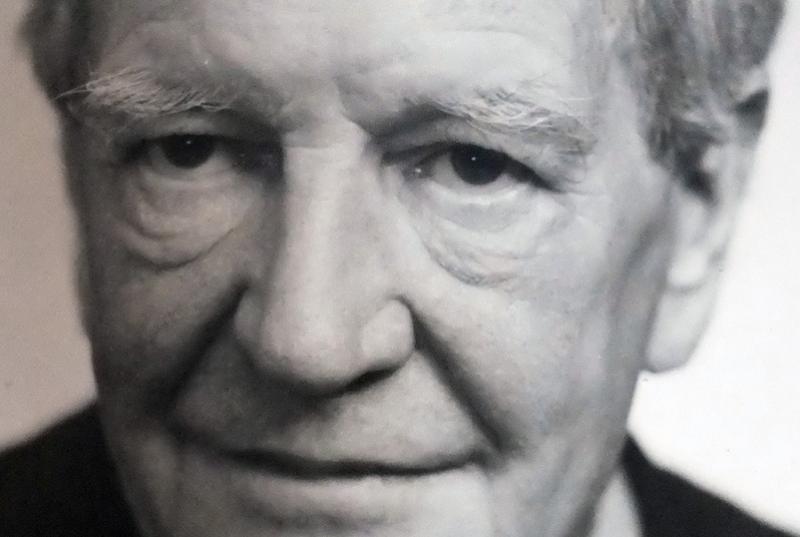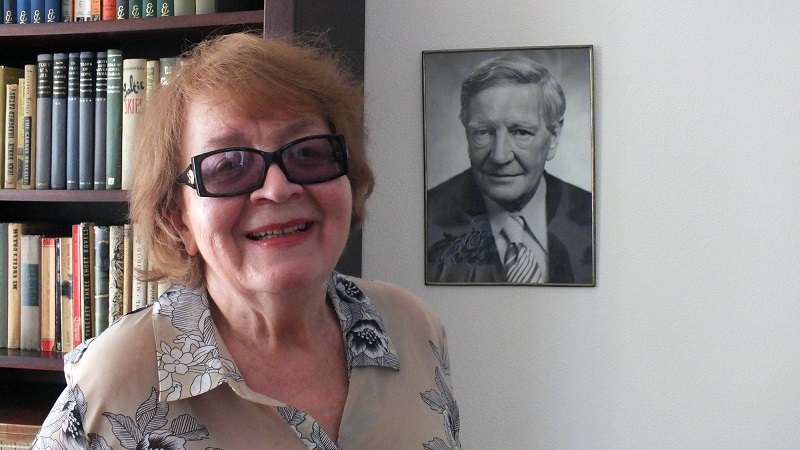The Spy Who Went Into the Cold, BBC Four | reviews, news & interviews
The Spy Who Went Into the Cold, BBC Four
The Spy Who Went Into the Cold, BBC Four
Atmospheric Storyville documentary on Kim Philby chases shadows

How much time does anyone want to spend in the company of Kim Philby? BBC Four’s Storyville allotted him 75 minutes, which isn’t much to tell the story of a third man with two paymasters and four wives. And yet this portrait somehow contrived to outstay its welcome. This is not to come over all huffy Heffer about betrayal. It’s just that hunting for the real Philby is like wandering around a maze uncertain if you’re looking for the entrance or the exit.
A dense construct of false fronts and double lives, raffishly charming and impeccably English, Philby amounted in The Spy Who Went into the Cold to a slippery nullity. A line-up of white-haired buffers had a go at outlining some memories. These included journalists, biographers, diplomats, historians and other assorted spook fanciers such as Phillip Knightley and the splendid Chapman Pincher, all of them emitting a faintly preposterous whiff of Empire starch and Establishment dust. None could quite put their finger on him, let alone land a glove. But then exactly how do you describe a void?
The facts of Philby’s career as a traitor were swiftly ticked off. The war was done and dusted within 10 minutes, and Philby was off from 1949 in Washington DC until Burgess and Maclean defected two years later, resulting in his own precautionary dismissal from the service. George Carey’s film was mostly interested in the long decade in which Philby, officially in the clear, and fixed up as a journalist in Beirut by friends on the edges of MI6, drank away the afternoons and waited to be exposed. This was the seedy period the likes of John Julius Norwich recalled with a cut-glass glint of nostalgic longing.
 The film trowelled on the atmos by wandering about the rackety old streets of Beirut, even retracing Philby’s footsteps as far as the flat in Moscow his cheerful widow Rufina still shares with his old copies of Dick Francis and PG Wodehouse. Carey was also properly interrogative about the whats and whens and hows of Philby’s eventual flit from under the quivering nostrils of MI6. In an eccentric sleuthing trip to the Royal Botanical Gardens, he established that Anthony Blunt’s arrival in Lebanon to look for a frog orchid must have been a cover, because frog orchids don’t grow there.
The film trowelled on the atmos by wandering about the rackety old streets of Beirut, even retracing Philby’s footsteps as far as the flat in Moscow his cheerful widow Rufina still shares with his old copies of Dick Francis and PG Wodehouse. Carey was also properly interrogative about the whats and whens and hows of Philby’s eventual flit from under the quivering nostrils of MI6. In an eccentric sleuthing trip to the Royal Botanical Gardens, he established that Anthony Blunt’s arrival in Lebanon to look for a frog orchid must have been a cover, because frog orchids don’t grow there.
But other questions went unasked, mostly about the sheer selfishness and inhumanity necessary for the double life. Philby privatised betrayal in his first three marriages, leaving a succession of women to suffer the consequences of his ideological commitment. He makes Henry VIII looked like a shining light of uxoriousness. The last Mrs Philby (pictured above) recalled a pathetically insecure old man who hated to let her out of his sight: the traitor fearing betrayal, perhaps. Philby’s adoring daughter Josephine, whose lined face bears the distinctive imprint of her father’s suave features, seemed not to know much about him beyond the shadow of his absence. “Dad was all over the place,” she recalled. “We never really knew what he was doing.” You craved more on this, and yet it’s clear why this couldn’t be a longer film. With Kim Philby, more would be only less.
rating
Explore topics
Share this article
The future of Arts Journalism
You can stop theartsdesk.com closing!
We urgently need financing to survive. Our fundraising drive has thus far raised £49,000 but we need to reach £100,000 or we will be forced to close. Please contribute here: https://gofund.me/c3f6033d
And if you can forward this information to anyone who might assist, we’d be grateful.

Subscribe to theartsdesk.com
Thank you for continuing to read our work on theartsdesk.com. For unlimited access to every article in its entirety, including our archive of more than 15,000 pieces, we're asking for £5 per month or £40 per year. We feel it's a very good deal, and hope you do too.
To take a subscription now simply click here.
And if you're looking for that extra gift for a friend or family member, why not treat them to a theartsdesk.com gift subscription?
more TV
 Murder Before Evensong, Acorn TV review - death comes to the picturesque village of Champton
The Rev Richard Coles's sleuthing cleric hits the screen
Murder Before Evensong, Acorn TV review - death comes to the picturesque village of Champton
The Rev Richard Coles's sleuthing cleric hits the screen
 Black Rabbit, Netflix review - grime and punishment in New York City
Jude Law and Jason Bateman tread the thin line between love and hate
Black Rabbit, Netflix review - grime and punishment in New York City
Jude Law and Jason Bateman tread the thin line between love and hate
 The Hack, ITV review - plodding anatomy of twin UK scandals
Jack Thorne's skill can't disguise the bagginess of his double-headed material
The Hack, ITV review - plodding anatomy of twin UK scandals
Jack Thorne's skill can't disguise the bagginess of his double-headed material
 Slow Horses, Series 5, Apple TV+ review - terror, trauma and impeccable comic timing
Jackson Lamb's band of MI5 misfits continues to fascinate and amuse
Slow Horses, Series 5, Apple TV+ review - terror, trauma and impeccable comic timing
Jackson Lamb's band of MI5 misfits continues to fascinate and amuse
 Coldwater, ITV1 review - horror and black comedy in the Highlands
Superb cast lights up David Ireland's cunning thriller
Coldwater, ITV1 review - horror and black comedy in the Highlands
Superb cast lights up David Ireland's cunning thriller
 Blu-ray: The Sweeney - Series One
Influential and entertaining 1970s police drama, handsomely restored
Blu-ray: The Sweeney - Series One
Influential and entertaining 1970s police drama, handsomely restored
 I Fought the Law, ITVX review - how an 800-year-old law was challenged and changed
Sheridan Smith's raw performance dominates ITV's new docudrama about injustice
I Fought the Law, ITVX review - how an 800-year-old law was challenged and changed
Sheridan Smith's raw performance dominates ITV's new docudrama about injustice
 The Paper, Sky Max review - a spinoff of the US Office worth waiting 20 years for
Perfectly judged recycling of the original's key elements, with a star turn at its heart
The Paper, Sky Max review - a spinoff of the US Office worth waiting 20 years for
Perfectly judged recycling of the original's key elements, with a star turn at its heart
 The Guest, BBC One review - be careful what you wish for
A terrific Eve Myles stars in addictive Welsh mystery
The Guest, BBC One review - be careful what you wish for
A terrific Eve Myles stars in addictive Welsh mystery
 theartsdesk Q&A: Suranne Jones on 'Hostage', power pants and politics
The star and producer talks about taking on the role of Prime Minister, wearing high heels and living in the public eye
theartsdesk Q&A: Suranne Jones on 'Hostage', power pants and politics
The star and producer talks about taking on the role of Prime Minister, wearing high heels and living in the public eye
 King & Conqueror, BBC One review - not many kicks in 1066
Turgid medieval drama leaves viewers in the dark
King & Conqueror, BBC One review - not many kicks in 1066
Turgid medieval drama leaves viewers in the dark
 Hostage, Netflix review - entente not-too-cordiale
Suranne Jones and Julie Delpy cross swords in confused political drama
Hostage, Netflix review - entente not-too-cordiale
Suranne Jones and Julie Delpy cross swords in confused political drama

Add comment